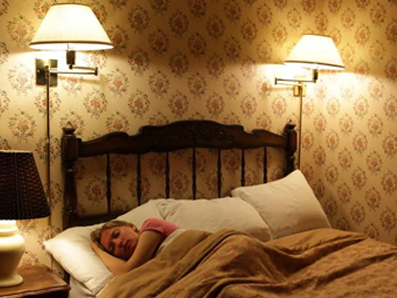
4. Light Exposure During Sleep May Increase Insulin Resistance |

![]() According to the preliminary results from a study under the lead researcher Ivy Cheung Mason, Ph.D, a postdoctoral fellow at Northwestern University Feinberg School of Medicine, night time light exposure during sleep may affect metabolic function.
According to the preliminary results from a study under the lead researcher Ivy Cheung Mason, Ph.D, a postdoctoral fellow at Northwestern University Feinberg School of Medicine, night time light exposure during sleep may affect metabolic function.
![]() The aim of this study was to test the hypothesis that light exposure at night during sleep adversely impacts metabolic outcomes. "Findings from the study show that a single night of light exposure during sleep acutely impacts measures of insulin resistance". Insulin resistance is the diminished ability of cells to respond to insulin’s action of transporting glucose out of the bloodstream and precedes the development of type 2 diabetes.
The aim of this study was to test the hypothesis that light exposure at night during sleep adversely impacts metabolic outcomes. "Findings from the study show that a single night of light exposure during sleep acutely impacts measures of insulin resistance". Insulin resistance is the diminished ability of cells to respond to insulin’s action of transporting glucose out of the bloodstream and precedes the development of type 2 diabetes.
![]() Twenty healthy adults of ages 18 to 40 were randomized into Dark-Dark (DD) or Dark-Light (DL) groups and run in parallel for a three day and two-night stay. Participants had eight hours of sleep opportunity each night starting at habitual bedtime determined from one week of actigraphy with sleep diary. The DL group (n=10, 2 males, ages 26.61 ± 4.64 years) slept in the dark (< 3 lux) on Night 1 and slept in overhead room (light of 100 lux) on Night 2, while the DD group (n=10, 4 males, age 26.78 ± 5.15 years) slept in the dark (<3 lux) on both Nights 1 and 2.
Twenty healthy adults of ages 18 to 40 were randomized into Dark-Dark (DD) or Dark-Light (DL) groups and run in parallel for a three day and two-night stay. Participants had eight hours of sleep opportunity each night starting at habitual bedtime determined from one week of actigraphy with sleep diary. The DL group (n=10, 2 males, ages 26.61 ± 4.64 years) slept in the dark (< 3 lux) on Night 1 and slept in overhead room (light of 100 lux) on Night 2, while the DD group (n=10, 4 males, age 26.78 ± 5.15 years) slept in the dark (<3 lux) on both Nights 1 and 2.
![]() Overnight polysomnography and hourly blood sampling for melatonin were collected on both nights. Oral glucose tolerance tests were performed on both mornings following sleep in the dark or in the light. Changes from Day/Night 1 to Day/Night 2 were examined between DD and DL groups. The extent of insulin resistance was also measured.
Overnight polysomnography and hourly blood sampling for melatonin were collected on both nights. Oral glucose tolerance tests were performed on both mornings following sleep in the dark or in the light. Changes from Day/Night 1 to Day/Night 2 were examined between DD and DL groups. The extent of insulin resistance was also measured.
![]() Insulin resistance was found to be significantly higher (p<0.05) in the morning following sleep in the light (DL group) compared to sleep in the dark (DD group). This effect was primarily due to increased insulin levels for DL compared to DD group.
Insulin resistance was found to be significantly higher (p<0.05) in the morning following sleep in the light (DL group) compared to sleep in the dark (DD group). This effect was primarily due to increased insulin levels for DL compared to DD group.
![]() The study thus suggests that a single night of light exposure during sleep acutely impacts the measures of insulin resistance. "Light exposure overnight during sleep has been shown to disrupt sleep, but these data indicate that it may also have the potential to influence metabolism." Mason said.
The study thus suggests that a single night of light exposure during sleep acutely impacts the measures of insulin resistance. "Light exposure overnight during sleep has been shown to disrupt sleep, but these data indicate that it may also have the potential to influence metabolism." Mason said.
![]() "These results are important given the increasingly widespread use of artificial light exposure, particularly at night," said Mason. "The effect we see is acute; more research is needed to determine if chronic overnight light exposure during sleep has long-term cumulative effects on metabolic function."
"These results are important given the increasingly widespread use of artificial light exposure, particularly at night," said Mason. "The effect we see is acute; more research is needed to determine if chronic overnight light exposure during sleep has long-term cumulative effects on metabolic function."
For enquiries info@jothydev.net.
Please visit: jothydev.net | research.jothydev.com | diabscreenkerala.net | jothydev.com/newsletter
